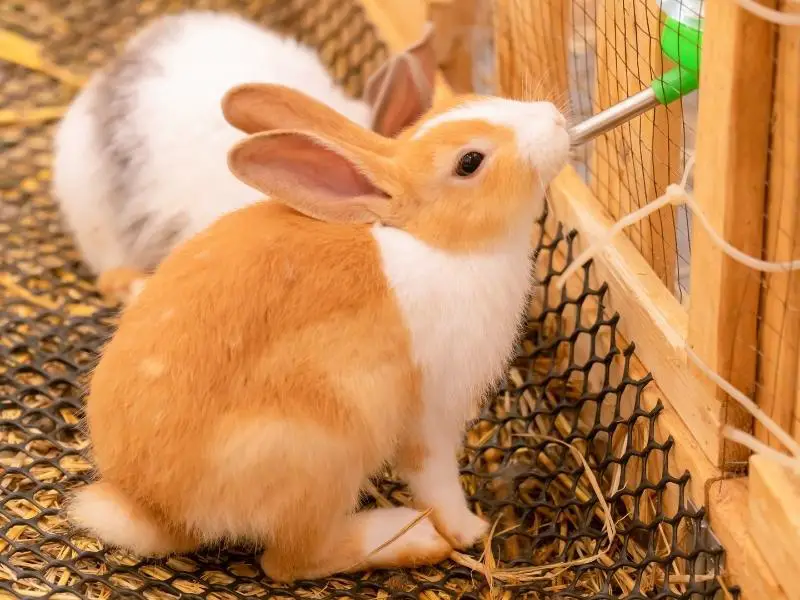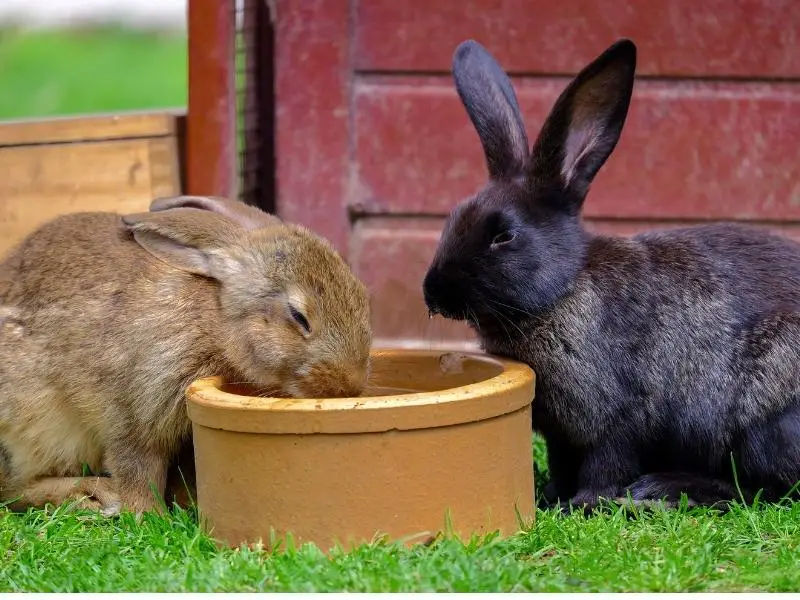If your rabbit “enjoys” sharing your cereal with milk with you in the morning, you may start wondering if rabbits can have dairy. But rabbits will try to eat anything that’s not healthy for them if given the chance. That includes milk.
Rabbits can’t drink cow milk or plant-based milk because the nutritional makeup of these is very different from rabbit milk, and adult rabbits are lactose intolerant. A baby rabbit should only drink milk from a nursing mother rabbit or be fed fresh goat milk or kitten milk replacer.
Learn more about the dangers of feeding your bunny milk, when and what you can feed an orphaned baby rabbit, and more in this detailed guide.
What Kind of Milk Can Rabbits Drink?
Rabbits shouldn’t drink any kind of milk.
Adult rabbits are lactose intolerant, meaning their bodies aren’t able to digest the main protein found in milk and dairy products. If you regularly feed your adult rabbit milk, it can lead to serious health complications that can be fatal.
Baby rabbits are not lactose intolerant, but they should ideally only drink the milk their mother produces. This rabbit milk has the perfect nutritional value that kits (baby bunnies) need to grow.
If you find an orphaned rabbit or the mother rabbit rejects a kit, it’s best to find another nursing mommy rabbit to take care of the baby (aka feed the baby).
But this isn’t always an option or possible. If there’s no way you can get rabbit milk to feed the baby bunny, then you can use goat’s milk or a kitten formula. Another option is a milk replacer for puppies if you can’t get goat’s milk or kitten formula.
These baby rabbit milk alternatives have a higher protein content and are higher in calories than cow’s milk, for example, which makes them more suitable and a closer match to rabbit milk’s nutritional makeup.
To up the calorie count, even more, add one tablespoon of unsweetened 100% heavy whipping cream to one can of kitten milk replacer or ¼ cup (2 ounces) of goat’s milk.
Another alternative is to mix ½ cup of fresh, whole goat’s milk, ½ cup of kitten milk replacer, ½ teaspoon of unsweetened 100 % heavy whipping cream, and 1-1.5 tablespoons (of lyophilized (freeze-dried) colostrum powder (or the contents of 10 capsules).
Up to the 10-week mark, you can syringe feed the kits, and when they’ve opened their eyes, they can lap up the milk from a bowl.
Feed a baby bunny milk until they are 6-8 weeks old, and then transition them to drinking water, alfalfa hay, and pellets.
Dangers of Letting Your Rabbit Drink Milk
Letting your pet rabbit drink milk that’s not suitable for them can lead to serious digestive problems like gastrointestinal stasis (GI stasis).
A rabbit’s body can’t digest the main protein found in milk and dairy products because they are lactose intolerant (adult bunnies). Bunnies can’t vomit, so they can’t get rid of the milk that their bodies can’t digest.
The result is GI stasis where their gut slows down and eventually, your bun may stop eating altogether. If you don’t get your rabbit to a rabbit-savvy vet, your pet bunny will die.
And if your rabbit has diarrhea after ingesting non-rabbit milk, get help from your local vet ASAP.
You also can’t feed milk to a baby bunny because non-rabbit milk doesn’t have enough protein, calories, and the right nutritional content to help a kit develop, grow, and thrive.
Types of Milk You Should NOT Feed Your Rabbit

Essentially, you shouldn’t feed ANY kind of milk to an adult rabbit.
Here are various types of milk to avoid in case you would like info on each:
Coconut Milk
Adult or baby rabbits shouldn’t drink coconut milk because it’s too high in fat. It can cause your rabbit to become overweight, and it leads to GI stasis, so it is best avoided.
Oat Milk
Oat milk doesn’t contain the right nutritional content for a kit to thrive, and there are no health reasons or nutritional value to feeding oat milk to an adult bunny.
Almond Milk
A rabbit – adult or baby – can’t drink almond milk. Sure, this plant-based milk is lactose-free, but ingesting almond milk will upset your rabbit’s sensitive tummy.
Cow Milk
Cow’s milk – whether it is fresh, powdered, pasteurized, unpasteurized, full-fat, low fat, fat-free, lactose-free, or whatever – is a NO for a rabbit.
A lot of artificial and natural ingredients found in cow milk are not rabbit-friendly. Some of these ingredients are:
- Antibiotics
- Pus that carries the risk of bacterial infection for your bun
- Traces of blood
- High fat and protein content can cause diarrhea
- Gastrointestinal peptides
- Hormones
Evaporated Milk
A baby rabbit’s gut can’t digest evaporated milk, and it’s best to not feed evaporated milk to your mature rabbit either.
Soy Milk
Soy milk is high in fat and protein, so it can cause obesity and gastrointestinal issues in your bun. So don’t give your rabbit soy milk to drink.
Powdered Milk
Powdered milk generally contains added sugar and preservatives to give it longer shelf life, making it too high in sugar for a rabbit.
Powdered milk will also cause your rabbit to become overweight and suffer from severe gut issues if you feed your rabbit this type of milk.
Other Milk Alternatives for Rabbits
Other alternatives to milk that are safe for your rabbit include:
- Clean drinking water
- Clean water flavored with herbs, strawberries, or unsweetened apple or carrot juice
- Herbal “teas” – chamomile, rosemary, peppermint, lavender, lemon balm, or oregano (shouldn’t contain tea leaves or caffeine)
- Fresh goat milk – for orphaned baby rabbits only (experts recommend Meyenberg goat milk)
- Kitten formula – for orphaned baby rabbits only
- A milk replacer for puppies – for orphaned baby rabbits only
My Last Bunny Thoughts
Never feed rabbit milk. It isn’t good for them and will only make your bunny sick.
It’s ok if your bunny licks a tiny amount of milk or yogurt from your cereal bowl, but don’t encourage this. And if possible, keep your bunny away when you eat food that isn’t suitable for a rabbit.
Related Articles:

